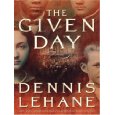Deviation Posting – Dennis Lehane’s The Given Day
Posted: August 12th, 2009 | No Comments » My summer holiday reading was somewhat enlivened by picking up a copy, quite by chance, of Dennis Lehane’s The Given Day. I’d never read Lehane before and assumed he was just a crime writer (I say ‘just’ knowing that crime writing friends will haul me over the coals for that dismissive comment). I actually have some of his crime fiction sitting on the shelf waiting to be read and he comes highly recommended by friends who read crime novels obsessively as I do myself. But The Given Day is something else.
My summer holiday reading was somewhat enlivened by picking up a copy, quite by chance, of Dennis Lehane’s The Given Day. I’d never read Lehane before and assumed he was just a crime writer (I say ‘just’ knowing that crime writing friends will haul me over the coals for that dismissive comment). I actually have some of his crime fiction sitting on the shelf waiting to be read and he comes highly recommended by friends who read crime novels obsessively as I do myself. But The Given Day is something else.
The Given Day is one of those great sprawling sagas that the Americans do so well. It must be coming from a big country with such melting pot of modern history and without the burdensome centuries of earlier history to deal with. British writers just don’t quite do the sprawling British novel quite so well though with some honourable exceptions that spring to mind (Peter Flannery’s Our Friends in the North, David Peace’s GB84 and the Red Riding Quartet as well as, I’d argue a little more contentiously perhaps some of Martina Cole’s sagas of London gangland). The Brits tend to do better at sagas of the posh (Waugh’s Brideshead Revisited etc) which, while fine, don’t have much specific to say about the national experience for those of us from further down the social scale. With modern America built largely on the back of the working classes who emigrated there and, of course, the black population their great sagas tend to be more rooted in ordinary people.
 Lehane’s saga concentrates on 1918-1919 Boston, just after WW1 and the terrible flu epidemic obviously, but also (which you hear less about these days) the crackdown on the Left that occurred at the time and the Boston Police strike of 1919. The story centres around a black man who ends up in Boston as well as a family of Irish Boston cops. There’s a good sprinkling of real life characters – Babe Ruth, J Edgar Hoover, Sam Gompers, John Reed etc.
Lehane’s saga concentrates on 1918-1919 Boston, just after WW1 and the terrible flu epidemic obviously, but also (which you hear less about these days) the crackdown on the Left that occurred at the time and the Boston Police strike of 1919. The story centres around a black man who ends up in Boston as well as a family of Irish Boston cops. There’s a good sprinkling of real life characters – Babe Ruth, J Edgar Hoover, Sam Gompers, John Reed etc.
 If I have a complaint about the book it’s the rather old fashioned and cardboard cutout portrayal of the radical Left at the time. Boston cops organising a union is deemed OK and those on the soft Left striking against terrible working conditions get out of the book OK too but anyone more radical ends up looking a bit like those old stock characters of anarchists with round black bombs, fuses sizzling, running round. There was a lot more ideology to the anarchist movement than Lehane appears to credit them with while the Industrial Workers of the World (IWW – the “Wobbliesâ€) were, I’d argue, a seriously advanced bunch of people.
If I have a complaint about the book it’s the rather old fashioned and cardboard cutout portrayal of the radical Left at the time. Boston cops organising a union is deemed OK and those on the soft Left striking against terrible working conditions get out of the book OK too but anyone more radical ends up looking a bit like those old stock characters of anarchists with round black bombs, fuses sizzling, running round. There was a lot more ideology to the anarchist movement than Lehane appears to credit them with while the Industrial Workers of the World (IWW – the “Wobbliesâ€) were, I’d argue, a seriously advanced bunch of people.
Still it’s a good read. Having also recently read Kurt Anderson’s Heyday (see post), a swirling saga of nineteenth century America I can’t help wishing British authors would take up the genre a little more often, dump the endless stately homes and too posh to wash characters and give us a little more grit.
Leave a Reply